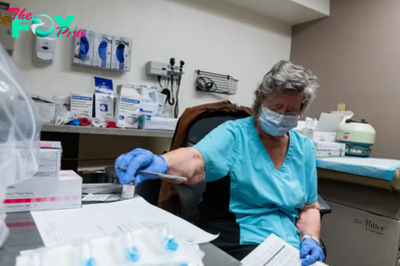Health
Hospitals suing patients over unpaid bills would have to put their names on the lawsuits under new Colorado bill
Colorado lawmakers are considering a bill that would prevent hospitals from publicly concealing their involvement in lawsuits against patients, following a joint Colorado Sun/9News investigation into the practice.
The bill, House Bill 1380, would apply to all debt collection lawsuits broadly, not just those over medical debt. It would require that the owner of a debt be listed among the plaintiffs in any lawsuit seeking to collect on the debt.
The bill passed its first committee hearing late Wednesday. Supporters say they hope the bill will make it easier for people to understand who is suing them and why in debt collection cases.
“When a consumer doesn’t recognize the name, they often ignore the action, and that can make things worse for them,” said state Rep. Javier Mabrey, D-Denver, one of the bill’s lead sponsors.
The proposal addresses an issue highlighted in The Sun and 9News’ investigation.
The investigation, which was done in conjunction with the Colorado News Collaborative and KFF Health News, found that UCHealth, the state’s largest health care provider, has sued thousands of patients per year over what it claimed were unpaid bills. But UCHealth’s involvement in the lawsuits was invisible to the public because the lawsuits were filed in the names of debt collection companies working for the health care providers.

“Diagnosis: Debt Colorado” is a reporting partnership among KFF Health News, the Colorado News Collaborative, The Colorado Sun, 9News, Colorado Newsline and The Sentinel exploring the scale, impact, and causes of medical debt in Colorado. The ongoing series branches from KFF Health News’s award-winning reporting on medical debt in the United States.
It is common practice for hospitals and other medical providers to work with debt collection companies to pursue patients for money. But providers like UCHealth go a step further and “assign” the debt to the debt collector without relinquishing ownership of the debt.
Based on that, the debt collection companies put their own names on lawsuits against patients, arguing that they are the proper plaintiff even though the money isn’t owed to them.
Since the publication of the investigation, The Sun and 9News have learned of multiple other hospitals and medical groups in Colorado that engage in the same practice.
UCHealth officials told The Sun and 9News that the health system sued more than 15,000 patients between 2019 and 2023 over debts. Since 2000, almost none of the cases has listed UCHealth as a plaintiff. Jacki Cooper Melmed, UCHealth’s chief legal officer, said it makes more sense to use the debt collectors’ names on the lawsuits because they are the ones making decisions about the lawsuits.
“We are not hiding anything,” she said. “There is no mystery about what’s going on here.”
☀️ READ MORE
Bipartisan group of lawmakers wants to change Colorado’s school funding formula after 30 years
Republican state representative left a loaded handgun in Colorado Capitol bathroom
Lawsuit alleges Trisha Calvarese, Democratic nominee for 4th Congressional District special election, is ineligible
But consumer-advocacy groups say the system has the effect of concealing UCHealth’s involvement in the lawsuits, making it harder to track the enormous amount of litigation coming from the nonprofit hospital system.
“This is not how responsible parties should act,” Carly Weisenberg, the lead health care organizer at the Center for Health Progress, testified Wednesday before the state House Judiciary Committee. “Deceiving people who owe money should never be a strategy to hide affiliation.”
Weisenberg’s organization currently has a campaign pressuring UCHealth to stop suing patients.

Multiple patients sued over UCHealth debts told The Sun and 9News that the practice of suing under the debt collectors’ name caused them confusion as they struggled to understand who was suing them and what the bill was for.
The only note of the health system’s involvement in the cases comes in brief attachments to the lawsuit complaints that are sealed from public view. Even then, the attachments provide the barest of information and are not on any kind of official form or letterhead, leading some patients to question whether the lawsuits were a scam.
At Wednesday’s committee hearing, Mabrey, the sponsor, said this kind of confusion is common in cases where people are sued by entities who don’t actually own the debt they are suing over.
“At a certain point it feels like, ‘What part of this is real?'” he said.
That skepticism could cause people not to respond to the lawsuits, leading to default judgments and wage-garnishment orders being entered against them.
-

 Health51m ago
Health51m agoDoctor’s bills often come with sticker shock for patients − but health insurance could be reinvented to provide costs upfront
-

 Health16h ago
Health16h agoWhat an HPV Diagnosis Really Means
-

 Health21h ago
Health21h agoThere’s an E. Coli Outbreak in Organic Carrots
-

 Health1d ago
Health1d agoCOVID-19’s Surprising Effect on Cancer
-

 Health2d ago
Health2d agoWhat to Know About How Lupus Affects Weight
-

 Health5d ago
Health5d agoPeople Aren’t Sure About Having Kids. She Helps Them Decide
-

 Health5d ago
Health5d agoFYI: People Don’t Like When You Abbreviate Texts
-

 Health5d ago
Health5d agoKnee problems tend to flare up as you age – an orthopedic specialist explains available treatment options



























